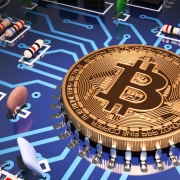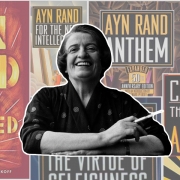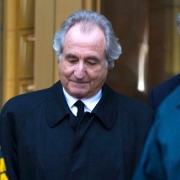On March 20th, this series explored conformity to popular trends and mediocrity, average ability combined with envy. In the article, Bernie Madoff’s obsession with “beating the market” was compared to Peter Keating’s obsession with socially acceptable architecture in Ayn Rand’s classic novel, The Fountainhead. Madoff was envious of the stock market’s price discovery mechanism, and Keating was envious of Howard Roark’s creative genius, the object of their envy being independence and principles.
In our postmodern and technology-dominated world, the new deity is the administrative state. Their religion is politics, and its catechism is complex computer models for predicting the future and controlling behavior, not quaint moral principles. When a missionary of this dogma wins the Nobel Prize, it is tantamount to being canonized. Among all of the progressive thumbsuckers and professors of economics, Paul Krugman is that mediocrity. Not just any mediocrity, he’s hit the trifecta of academia, journalism, and politics.
As a New York Times columnist, he is the ideal spokesman for their compassionate communism editorial board, or what is known in academic circles as New Keynesian Economics. In summary, it strives to integrate microeconomic conditions with traditional Keynesian macroeconomic effects. For example, when productive output does not equal aggregate demand, it’s because we are poor, dumb slobs. Actually, this “coordination failure” is caused by “monopolists” creating unavoidable “imperfect competition.”
For John M. Keynes, the “imperfect” free exchange among producers and consumers is the result of,
Animal spirits—a spontaneous urge to action rather than inaction, and not the outcome of a weighted average of quantitative benefits multiplied by quantitative probabilities.
Fortunately, you poor, dumb slobs who lack Krugman’s quantitative sensibilities have been blessed! The saviors of fiscal policy in Congress and monetary policy at the Fed will make things right, like always. As Objectivist political economist Richard Salsman explains,
Paul Krugman is a self-described Very Serious Person, which makes him a Superb Economist (albeit a very weak logician), and it helps to be a Keynesian Crank, because if you’re not, you’re just Not Serious!
Seriously, Krugman’s attacks on free market economics are an attack on producers, prices, and profits. He is a relentless advocate for the expansion of government intrusion in economic life. His favorite advice is unlimited money supply growth and federal debt. His rationale is that economic recessions are caused by the “production gluts” of these monopolists exploiting irrational consumer confidence. Salsman continues,
The point of Keynesian policy isn’t to boost demand, stimulate the economy, and save capitalism, but to curb supply, deaden the economy, and sabotage capitalism. To deny the validity of Say’s Law. In short, to be a blithering idiot.
In her epic novel Atlas Shrugged, Ayn Rand describes Krugman’s pathology:
Every mediocrity with the power to dispose of the property of his betters, by his willingness to devote his life to his inferiors, is the foulest of creatures. The double-parasite who lives on the sores of the poor and blood of the rich, whom men regard as the moral ideal.
In Atlas Shrugged, Krugman’s fellow traveler in mediocrity is Wesley Mouch, the Director of the Bureau of Economic Planning. His character opens the dialogue in Chapter VI, Part II by asking “But can we get away with it?” Very appropriate for unlimited fiat currency. And like Krugman, Mouch had impeccable academic credentials,
Being college-bred and despising men who were in business, the diplomas had always hung on the wall in the manner of reproach to the world. The diplomas had not automatically produced the material equivalents of their attested spiritual value.
People who produce little find it easy to scapegoat producers, markets, and profits. Part of that formula is to denigrate material values, which is also easy when material values have no meaning to those who don’t earn them. To understand Krugman’s depravity, consider his April 13th advice regarding the Wuhan virus lockdown, “The idea that we can reopen in a matter of a few weeks is crazy.” According to Salsman, Krugman must believe “we’re all now ensconced in the Maoist-Keynesian psyche-ward.”
Or governors mansions. “But can we get away with it?” asked Cuomo, Newsome, DeWine, Whitmer, and Mills when deciding which business owners to condemn as non-essential.
Mouch and Company are exposing their intellectual impotence by substituting rational argument with psychological pressure, for the public good. In Atlas, it was the Equalization of Opportunity Act, combined with blackmail, that forced steel magnate Henry Rearden to sign over his patents. James Taggart, CEO of Taggart Transcontinental, had sold information to Mouch about sister Dagny’s (also Taggart COO) relationship with Rearden in exchange for wage and price concessions. Yet in public, Jim Taggart condemned profit.
In Dagny’s case, she refused to be a slave or slave-driver for Mouch’s Directive 10-289. Now non-fiction, the Directive’s Unification Board could have been designed by today’s progressive ideologues: “In the name of the general welfare, to protect the people’s security, to achieve full equality and total stability.”
Krugman’s version is any similar agency, such as the Consumer Financial Protection Bureau (CFPB). These monstrosities are their own lawmaker, cop, prosecutor, and judge. The CFPB is not even subject to Congressional oversight, yet Krugman defends it,
How to do it – a stand-alone agency with its own funding, protecting consumers against financial fraud and abuse. Republicans are demanding the bureau lose its independence. To take away its guaranteed funding, opening it to interest-group pressure.
In a August 2012 NYT piece, Krugman smeared Atlas Shrugged (“a perennial favorite among adolescent boys”) and Congressman Paul Ryan (“explicitly trying to make life harder for the poor”) for trying to control entitlement spending. Another economic fact that Krugman refuses to acknowledge is that the private sector pays for everything, including government. Yet Krugman seeks to regulate private, voluntary human interaction because Keynesian “animal spirits” are rooted in trust. To destroy trust, destroy money. To destroy money, inflate it. To inflate it, worship mediocrity. To worship mediocrity, invert justice.
Atlas Shrugged proves that earned money is justice. When given a bar of gold, by a pirate, as a refund of taxes looted from him, and as he realizes that justice might exist somewhere in the world, Henry “Rearden burst out laughing.”













